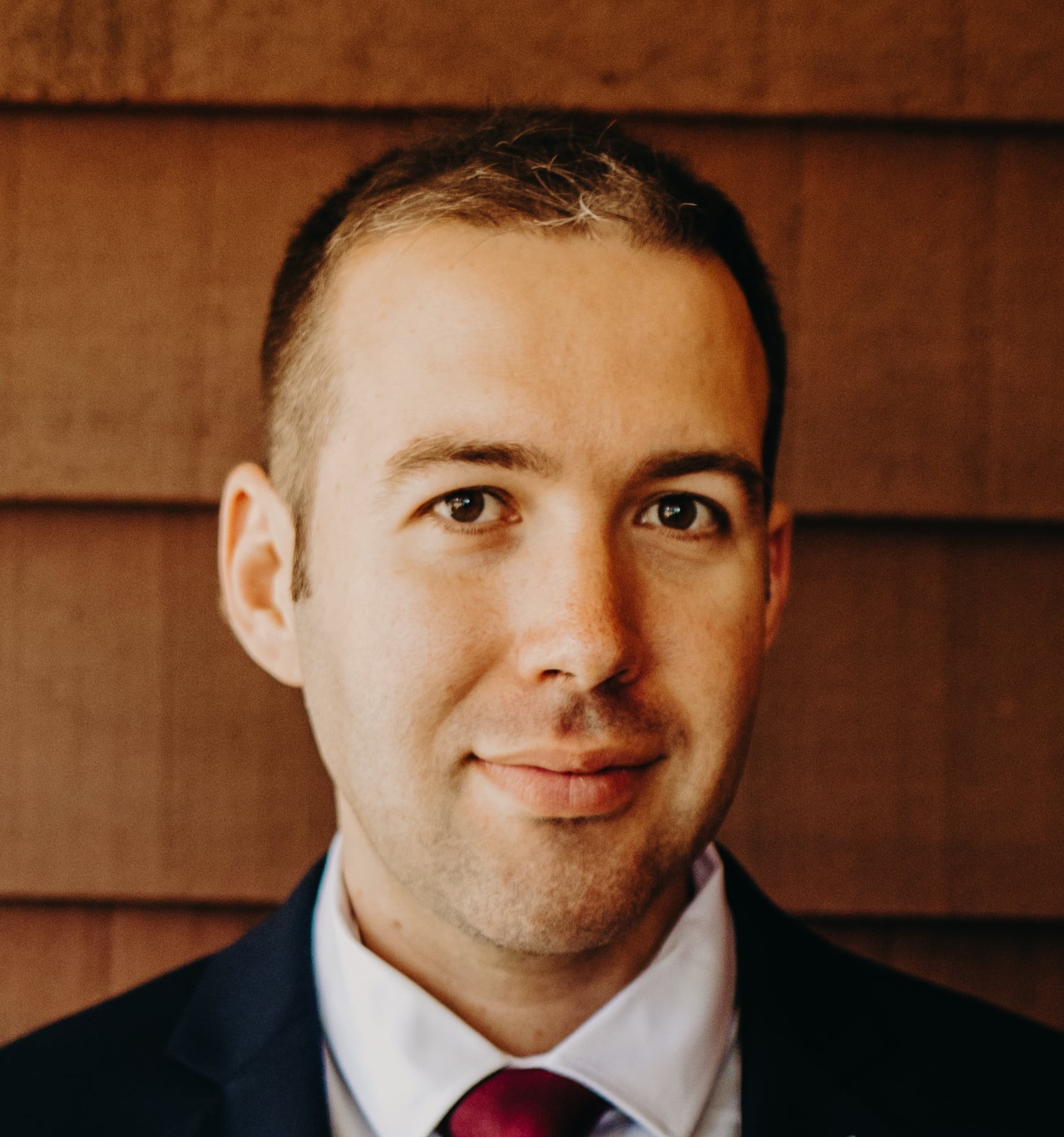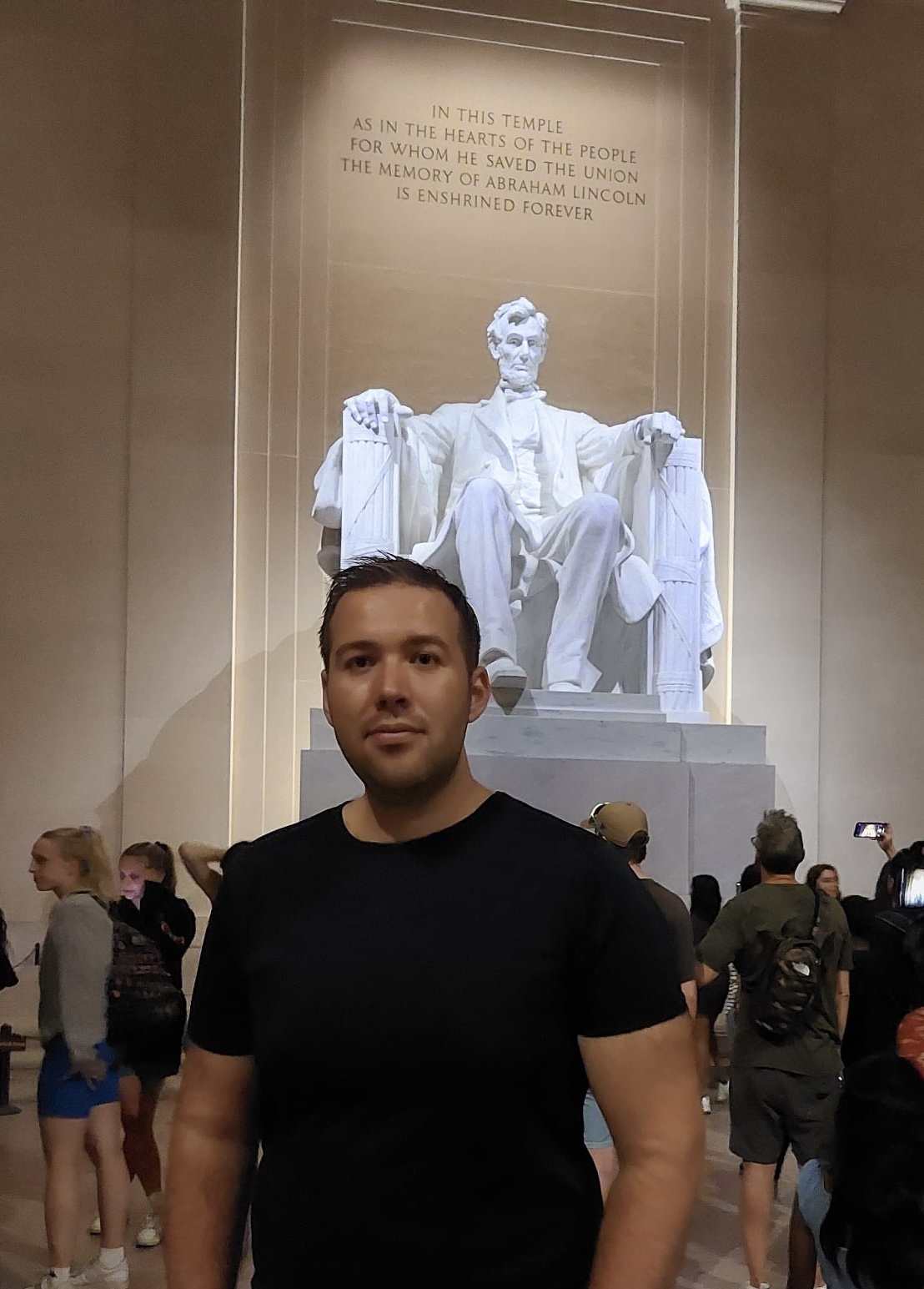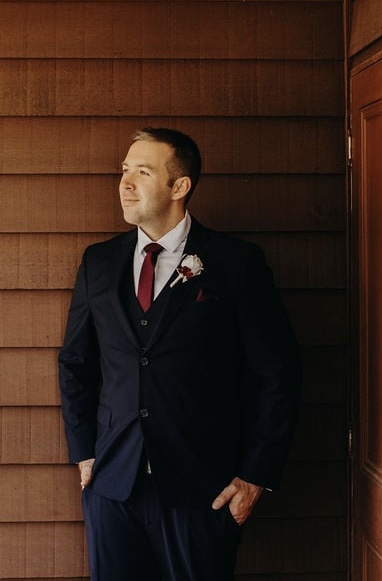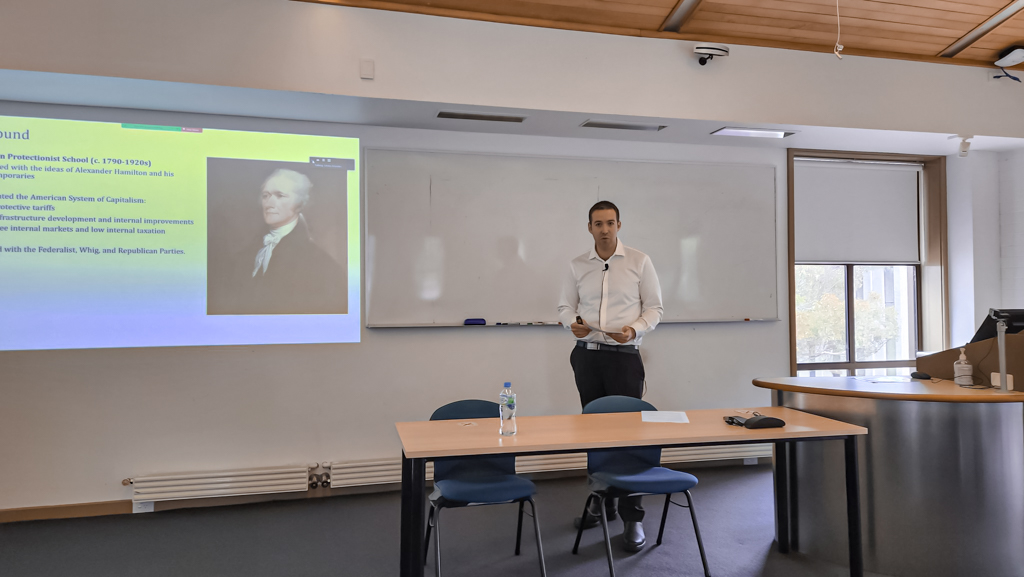Tell us a little about yourself?
 I grew up in the small rural town of Baradine in NSW. It is located about 30 minutes outside of Coonabarabran. I was always interested in economics, but it was my high school economics teacher at Coonabarabran High School who helped to foster my interest in the subject further. I then completed my Bachelor and Honours degree in economics at UNE, before undertaking my PhD programme at Federation University Australia. I am now a lecturer in the UNE Business School.
I grew up in the small rural town of Baradine in NSW. It is located about 30 minutes outside of Coonabarabran. I was always interested in economics, but it was my high school economics teacher at Coonabarabran High School who helped to foster my interest in the subject further. I then completed my Bachelor and Honours degree in economics at UNE, before undertaking my PhD programme at Federation University Australia. I am now a lecturer in the UNE Business School.
I became interested in my particular subfield during my honours year at UNE. I found that while there was a significant amount of literature in the field of economic history which discusses 19th century American protectionist policies, there was very limited literature discussing the ideas and theories which underpinned these policies. This caused me to look more into the history of economic thought, and eventually the ideas of the 19th century American Protectionists.
You completed your PhD last year, what were you researching?
This is correct. I completed my PhD in economics, and more specifically, in the subfield of the history of economic thought. My PhD research explores the American Protectionist School of economic thought which originated with the ideas of Alexander Hamilton, who was the first Secretary of the US Treasury. The main contribution of my thesis is the rediscovery and reconstruction of their system of economic thought. I did this by distilling their system of thought from the writings of roughly 70 writers from within the tradition.
Your PhD dissertation was awarded the 2024 Best PhD Dissertation Prize from HETSA, what was that experience like, and how has it shaped your research focus moving forward?
The PhD journey was long and a lot of hard work, so it was incredibly fulfilling that my dissertation was awarded the 2024 Best PhD Dissertation Prize from the History of Economic Thought Society of Australia. It was equally rewarding to receive my examiner feedback for my dissertation. Both examiners provided highly favourable comments and they both placed it in the top 5% of theses they had examined. Their suggestions are also proving valuable as I work on transforming my thesis into a book.
Van Buren Denslow is a relatively obscure figure in economic thought. What drew you to study his work?
 Van Buren Denslow
Van Buren Denslow
I came across Van Buren Denslow as part of my larger research project on the 19th American Protectionists. Although his approach broadly resembles that of other economists within this tradition, he stood out for his level of analytical depth and refinement. While virtually all other economists within this tradition focus on themes of entrepreneurial discovery, invention and economic diversification, Denslow goes further by integrating these themes into an analysis of profit. This level of refinement also extends beyond his analysis of profit and to other economic questions not discussed in the present paper.
Can you summarise Denslow’s Migratory Theory of Profit, how it differs from classical and Marxist theories of profit?
Although the Classical economists (e.g., Adam Smith, David Ricardo, John Stuart Mill) and Karl Marx provide different explanations of the underlying cause, they all held to the view that there exists a general tendency for the rate of profit to fall within capitalist economies. Van Buren Denslow, on the other hand, held that there is no such tendency since the emergence of new inventions and new industrial pursuits means that new sources of profits are always coming into existence. What the Classicals and Marxists mistake for a general falling rate of profit merely reflects the declining profitability of stagnant and mature industries. Moreover, Denslow also views this declining rate of profit in specific industries as a “migratory force” which compels entrepreneurs to seek out and discover new inventions and industrial pursuits which brings forth new sources of profit.
Do you think Denslow’s ideas remain relevant in today’s global economic landscape?
My research shows that there is a robust theoretical basis for protectionism. This is timely given the more populist thrust of recent arguments in favour of protective tariffs. Although Denslow’s migratory theory of profit does not directly relate to the debate on free trade versus protectionism, his broader economic thought and the thought of the School as a whole provides important insights for understanding protectionism in the 21st century. Moreover, usually when the benefits of free trade are questioned, this is done so by appealing to historical examples which are at odds with free trade theory. The American Protectionists went beyond this typical ‘theory versus practice’ debate by constructing economic theories which seek to explain these historical examples and which directly challenge free trade from a theoretical standpoint.
 Are there any modern schools of thought that build upon or resemble Denslow’s contributions?
Are there any modern schools of thought that build upon or resemble Denslow’s contributions?
It is not clear if there is any continuity or direct linkages between Denslow’s theory and that of later economists or schools. On the question of profit specifically, the idea that profit plays an important coordinating role in the economy is something shared by both the later Neoclassical and Austrian schools of thought. However, the key difference is that both these schools view profit as a signal which works to move the economy back into equilibrium, whereas Denslow, to borrow the vernacular of neoclassical economics, sees it as a disequilibrating force. It is a dynamic and migratory force which paves the way for new inventions and industrial pursuits. Speaking more generally, however, there is a resemblance between the ideas of the American Protectionists and those of the later economist Joseph Schumpeter. Both conceived of the economy as inventive and dynamic, and both emphasized the role of the entrepreneur in bringing about economic change.
What are some key takeaways you hope people will gain from your upcoming seminar?
I hope to show that studying the ideas of past economic thinkers can assist our understanding of economics in the present. It is not necessarily true, in my opinion, that the most recent theories are superior to older theories, so understanding the history of economic thought can help us to be better economically informed. I also hope that my seminar will challenge many of the preconceived notions regarding protectionism. Protectionism is often dismissed as economically illiterate within mainstream economics, yet few economists and other commentators have actually been acquainted with the ideas and arguments of the 19th century American Protectionists. It is also worth reiterating that Denslow’s migratory theory of profit does not directly relate to the topic of international trade, which demonstrates that the School was concerned with economic questions beyond the topic of protection. The theory is therefore valuable for the purposes of economic analysis even if one does not accept Denslow’s protectionist views.
How does Denslow’s work contribute to our understanding of entrepreneurial profit and economic development?
 Denslow’s theory does have important implications for our understanding of the economic development and entrepreneurial profit. Standard mainstream neoclassical models tend to view invention and technological change as an exogenous variable, meaning that it is considered to arise from outside the economic system. In contrast, Denslow’s migratory theory of profit shows that invention and the creation of new industrial pursuits is something which emerges endogenously from within the economy. A declining rate of profit in mature and stagnant industries will compel entrepreneurs to exit these industries and to engage in entrepreneurial discovery which brings forth new inventions and pursuits – economic resources will then migrate into these new pursuits. This facilitates economic development and greater economic diversification. With that said, I should perhaps point out that the American Protectionists did view invention as solely dependent on the profit motive of entrepreneurs. There is a broader emphasis on human ingenuity and invention in the economic theory of the American Protectionists. I discuss this topic at length in my dissertation.
Denslow’s theory does have important implications for our understanding of the economic development and entrepreneurial profit. Standard mainstream neoclassical models tend to view invention and technological change as an exogenous variable, meaning that it is considered to arise from outside the economic system. In contrast, Denslow’s migratory theory of profit shows that invention and the creation of new industrial pursuits is something which emerges endogenously from within the economy. A declining rate of profit in mature and stagnant industries will compel entrepreneurs to exit these industries and to engage in entrepreneurial discovery which brings forth new inventions and pursuits – economic resources will then migrate into these new pursuits. This facilitates economic development and greater economic diversification. With that said, I should perhaps point out that the American Protectionists did view invention as solely dependent on the profit motive of entrepreneurs. There is a broader emphasis on human ingenuity and invention in the economic theory of the American Protectionists. I discuss this topic at length in my dissertation.
What challenges did you face in researching and interpreting Denslow’s work, given his relative obscurity?
It was a very time-consuming task tracking down all of the writings and other primary sources of Van Buren Denslow and the broader American Protectionist School. In any event, it did give me the opportunity to undertake archival research in the United States. On the issue of textual interpretation itself, it is something that needs to be approached with care, as these economists were writing in a different time to our own. Denslow’s major work The Economic Philosophy of Society, Government, and Industry is also a very large and detailed work, spanning over 800 pages. Fortunately, however, he is a clear writer, which assisted the process. I also found that having knowledge of the broader literature of the School aided with the interpretation of Denslow’s work, as I was familiar with the intellectual context and tradition which he was writing in. It is unfortunate though that we do not have access to the full corpus of Denslow’s writings. Upon his death in 1902, he left a number of unpublished manuscripts to his housekeeper, but these manuscripts remain lost to this day.
What do you like to do when you're not researching?
Outside of research and teaching, I live with my wife and my three dogs. I also breed and raise muscovy ducks.


